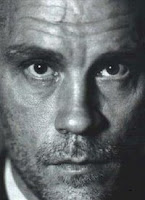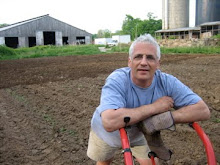A simple vision - to save a farm by creating a small community and building a relevant business on a tired or struggling farm - is becoming a quest for consensus. About a week, or so, ago I call Cris Coffin, who heads The American Farmland Trust's efforts in the New England region. It is her job to promote farmland protection, farm viability and farm conservation practices. She listens, suggests that I might have a unique idea, and recommends that I talk with the Connecticut Farmland Trust, as well as Brad Gentry at the Yale School of Forestry and Environmental Studies. This past Friday, I travel to New Haven to meet with Brad at Kroon Hall, the award-winning home of the Forestry School.
Aside from learning that environmental professors at Yale do not wear neckties to work ("This is a forestry school, Ben,") I learn that I have a lot of people to meet, and a lot of naive notions to shed. Brad explains that he does not typically get directly involved with projects, but that he enjoys facilitating, pairing people, and opening doors in specialized communities, so to speak. He explains that Yale School of Forestry has talented students who are actively involved in projects both as extracurricular volunteers and sometimes as part of their coursework. New names, hastily scratched on my yellow pad, will hopefully reappear, in life. These could be the folks who will be key to interpreting and helping to promote our not-for-profit sustainable farming community concept.
Later in the day, I write Brad to thank him for the meeting, and to ask if a sustainable model for our idea exists... one that we can personally embrace and take to others. He promptly writes back with three examples, and I decide to try his first recommendation, The Jones Family Farm (http://www.jonesfamilyfarms.com/farm), in Shelton , CT

Since I can't get through to the Jones Farm on the phone, I decide to drive there, anyway. Debbie is annoyed that she has to work, cannot come. I arrive there at noon, and as I walk up
I look for someone who can help me meet Terry Jones. Terry agrees to come down to the winery to meet for a brief introduction.
"Terry, I know this is a weekend. I'd love to say hello, if you have time, or maybe set a time for later."
"That's fine. I'm watching my grandchild... see you at the winery, about 1:30." There are tents set up for a cheese cake company, for sampling wine, a produce stand, a demo of a potato, squash salad, and a soup company. Jones Family Farm is the largest, most successful family farming operation I have seen. Sure, there are the Lymans and the Bishops, but there is an aesthetic sense of history and place to the farm. The fact that Terry Jones meets with me and spends nearly an hour trying to share his contacts and ideas is a simple testament to his wisdom and integrity.
"Ben, I think your idea is ambitious and very interesting." He thinks a minute, and says, "Farming is difficult, and it is a lifetime of experience. You have to respect the land, work with everything that comes your way."
"Terry, I think I know what you mean." I proceed to tell him about the 150 tomato plants I planted last
May, how there was no water available, that it had gotten dry, and how the plants were wilting. I explain how I drove to Stop & Shop to buy 47 gallons of spring water, then drove back at sunset and gave each plant a little drink.
"That's expensive," he laughs.
"Yeah, about forty cents a gallon, but we saved the plants, and next day, Farmer Brown installed a faucet in the basement of the barn so we could water the field."
As we get up to leave, we shake hands, and Terry says, "I want to see you succeed."
As I leave, I think about the contacts, the encouragement, and the model I've witnessed. I realize that there is no way I cannot succeed!


